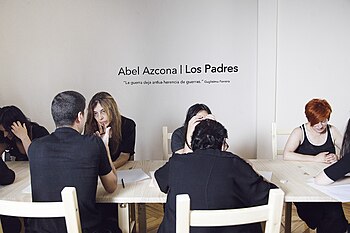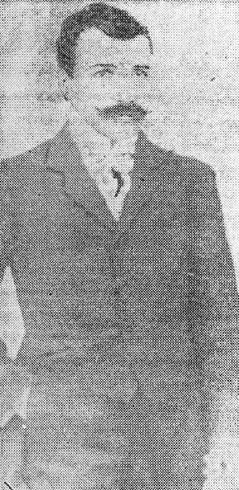
Selva lirica is an anthology published in 1917 by the Chilean Julio Molina Nuñez.
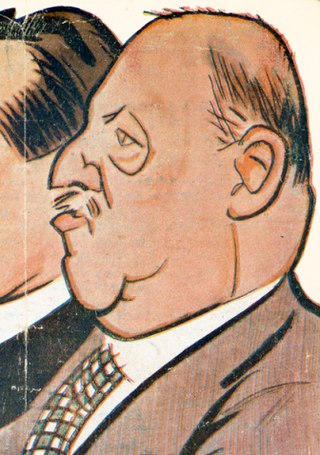
Joaquín Abatí y Díaz was a Spanish writer and Zarzuela Librettist.
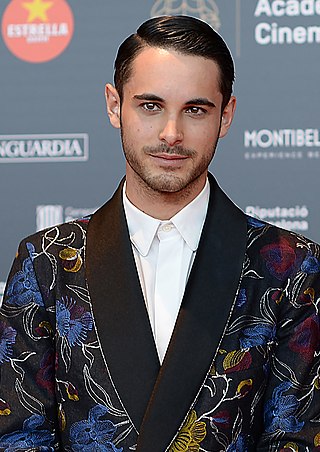
David Solans Cortés is a Spanish film and television actor.

Mikel Azcona Troyas is a Spanish auto racing driver who competes in the World Touring Car Cup for PWR Racing. He won the TCR Europe Touring Car Series championship in 2018 and 2021 and the WTCR championship in 2022.

Alicia Miyares Fernández is a Spanish philosopher, feminist, researcher, and women's rights activists. She has served as the spokesperson for several feminist organizations including anti-womb renting No Somos Vasijas and Recav. She has been involved with the efforts to keep abortion legal, writing the manifesto for the 2014 Tren de la Libertad. Miyares Fernández was active in advocating feminist causes ahead of the 2019 Spanish general elections.

Rocío Monasterio San Martín is a Spanish–Cuban architect, businesswoman and national-conservative politician. The leader of the Madrid branch of the Spanish political party Vox, she serves as a member of the 11th term of the Assembly of Madrid.
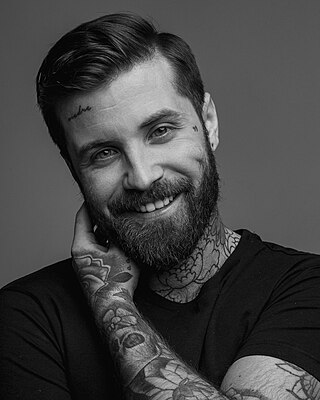
Abel Azcona is a Spanish artist, specializing in performance art. His work includes installations, sculptures, and video art. He is known as the "enfant terrible" of Spanish contemporary art. His first works dealt with personal identity, violence and the limits of pain; his later works are of a more critical, political and social nature.
Amen, more commonly known as The Pederasty, is a conceptual, critical and process artwork by Abel Azcona. Over several months, Azcona attended Eucharists in churches and parishes that were linked to his childhood. In the churches, the artist keeps the wafer or consecrated host given to the attendees of the communion. He gathered two hundred and forty-two wafers, which was the number of cases of pederasty reported in the north of Spain during the previous decade. With the wafers, he made a work in which the word Pederasty could be read. The work was first exhibited at a central Madrid art gallery in the summer of 2015.
Empathy and Prostitution is a conceptual and performative work of critical and biographical content by artist Abel Azcona. Azcona was inspired by his biological mother, a prostitute, and sought to empathise with her and with the moment of his own conception. Azcona offered himself naked to the galleries' visitors on a bed with white sheets, so that they could exchange intimacy or have sexual relations with him.

The Death of The Artist is a conceptual and performative work of critical content by artist Abel Azcona. The artwork was both a continuation of his earlier works and closure of the series, being performed in 2018 in the lobby of the Circulo de Bellas Artes in Madrid. His previous works had caused Azcona to receive threats, persecution, and acts of violence. By letter, the artist invited the organizations, groups, and entities that had threatened his life to the installation, where a loaded firearm was offered and Azcona stood exposed on a raised platform.
Buried is a conceptual and performative work of critical, social and political content by artist Abel Azcona. The performance artwork was created in 2015 through a public and participatory performance, or happening, on the esplanade of Franco's Monument to the Fallen in Pamplona. Azcona invited dozens of relatives of Republicans who were shot, persecuted or disappeared during the Spanish Civil War. Descendants of victims make up the installation in a row in front of the monument, all symbolically buried with soil from the garden of one of the participants, where his relatives had been shot. In 2016 the city of Pamplona invited Azcona to show his work inside the Monument and the project was recreated inside the Monument, which had been converted into an exhibition hall, under the name of Unearthed: A retrospective view on the political and subversive work of the artist Abel Azcona. The exhibition brought together the Buried project and fragments of all of Azcona's works.
There are symbols that cannot be covered. The Monument to the Fallen of Pamplona is a clear example. Fighting this symbol with another is what Navarrese artist Abel Azcona has proposed, known for his performance, sometimes controversial and often linked to the body. In this case, Azcona does not propose this new art exhibition as a war between symbols, but as an invitation to arouse feelings and, also, as a claim. For him, it is about inciting memory, individual and collective.
Eating is a conceptual and performative work of critical, polemical and political content by artist Abel Azcona. Also known as Eating a Koran, Eating a Torah and Eating a Bible.
The Shadow is a conceptual and performative work of critical, social and political content by artist Abel Azcona. In The Shadow, Azcona denounced cases of child abuse in a piece in which the survivors are the protagonists. In the work, Azcona presented more than two hundred actual cases of pedophilia in museums and galleries in various cities in Spain. At each show, Azcona gave a live performance from a wooden swing of the experiences of the survivors.

The Shame is a conceptual, critical and process artwork by Abel Azcona. Developed along the West Bank Wall in 2018, in The Shame Azcona installed original fragments of the Berlin Wall along the Israeli wall in the West Bank, which forms part of the barrier built throughout Israel to separate the Palestinian lands. Azcona made a metaphorical critique by merging both walls in the work. The actual installation, as if it were a piece of land art, currently remains along the wall, and has been exhibited in different countries through photographic and video art. The Israeli government has prohibited the artist from entering Israel because of the piece.
The Streets is a conceptual and performative work of critical and biographical content by artist Abel Azcona. At the end of 2014 and the early part of 2015, Azcona explored the processual work La Calle this time in the Santa Fe locality of Bogota, where he prostituted himself on the streets. In this new work, he explored a change towards the figure of his mother, taking hormones and engaging in prostitution. Azcona was inspired by his biological mother, a prostitute, and sought to empathise with her and with the moment of his own conception. The process continued in the cities of Madrid and Mexico City. The performance emerged, as with the rest of his sex-themed works, as an exercise in empathy with his own biological mother. It was also a social critique, where the artist explored the limits of his body by repeating patterns of sexual abuse, which occurred in his own childhood and in the life of his mother.
File 09812 is a conceptual and performative work of critical and biographical content by artist Abel Azcona. The artist shows, in an art installation and documentary way, his Social Welfare file, fully exposed in various occasions. These documents speak of a child in a situation of total abandonment, with visible signs of abuse, neglect and malnutrition, and testimonies from neighbors and the environment are provided confirming that the child could be left for weeks in total solitude in the apartment, which did not meet the minimum habitability conditions. The documentary installation is accompanied by a performative reading of each of the pages of the file by Abel Azcona himself. The artwork was responsible for inaugurating the International Contemporary Art Fair of the Mediterranean. The work was part of the retrospective exhibition dedicated to the artist by the city of Pamplona in 2015.
Disturbing and disconcerting. Intimate and emotional. Abel Azcona, who had already been seen by the fair, walks barefoot and dressed completely in black on the esplanade of the Palau de la Festa and surroundings. He stands among the people, who await him. He gets on stage with some papers. File No. 09812 begins. Azcona stands facing the public, who is staring, and begins to read the file. And so, among the coldness of those mechanical words and administrative jargon, his childhood is recounted; prostitute mother, drug addict father, from house to house, environments in which a child should never be found, social services, an expensive attempt at adoption by a foster family and even sexual abuse. A long process that evidences a hard childhood. Azcona finishes reading File No. 09812, his file. He finishes and gets off the platform, leaves the esplanade and walks through the surroundings in tears until Enrique Bocángelus, director of the International Contemporary Art Fair of the Mediterranean Mars, approaches him and they merge into a hug. People, meanwhile, read the file, perhaps trying to understand why a child has to go through something like that or simply thanking him for being able to expose it that way. Mars is silent, and that is only the first day.
The Nine Confinements, also known as The Deprivation of Liberty is a conceptual, endurance art and performative work of critical and biographical content by artist Abel Azcona. The artwork was a sequence of performances carried out between 2013 and 2016. All of the series had a theme of deprivation of liberty. The first in the series was performed by Azcona in 2013 and named Confinement in Search of Identity. The artist was to remain for sixty days in a space built inside an art gallery of Madrid, with scarce food resources and in total darkness. The performance was stopped after forty-two days for health reasons and the artist hospitalised. Azcona created these works as a reflection and also a discursive interruption of his own mental illness, being one of the recurring themes in Azcona's work.

Spain Asks for Forgiveness is a conceptual and performative work of critical and anti-colonial content by recognized artist Abel Azcona. Created and started in Bogotá in November 2018 through a conference and a live performance by Azcona at the museum of contemporary art of Bogotá.
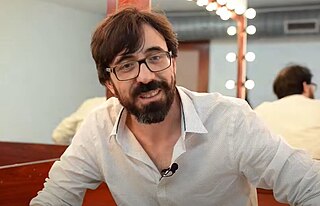
Israel Elejalde is a Spanish actor as well as a theatre director. Primarily a stage actor with television and film incursions, he had a breakthrough film performance with his role in the 2014 film Magical Girl, which earned him a nomination to the Goya Award for Best New Actor.

Chanel Terrero Martínez, known simply as Chanel, is a Spanish-Cuban singer, dancer and actress, having worked in several stage musicals. She represented Spain at the Eurovision Song Contest 2022, after having won Benidorm Fest 2022 with her debut single "SloMo". She finished in third place with 459 points, the best placing for Spain since the 1995 contest.
